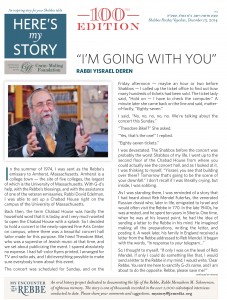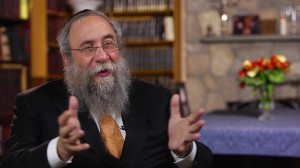HMS #100: “I’m going with you”
In the summer of 1974, I was sent as the Rebbe’s emissary to Amherst, Massachusetts. Amherst is a college town – the site of five colleges, the largest of which is the University of Massachusetts. With G-d’s help, with the Rebbe’s blessings, and with the assistance of one of the veteran emissaries, Rabbi Dovid Eidelman, I was able to set up a Chabad House right on the campus of the University of Massachusetts.
Back then, the term Chabad House was hardly the household word that it is today, and I very much wanted to open the Chabad House with a splash. So I decided to hold a concert in the newly-opened Fine Arts Center on campus, where there was a beautiful concert hall tailor made for this purpose. We hired Theodore Bikel, who was a superstar of Jewish music at that time, and we set about publicizing the event. I spared absolutely no expense. I had full-color flyers printed, I arranged for TV and radio ads, and I did everything possible to make sure everybody knew about this event.
The concert was scheduled for Sunday, and on the Friday afternoon – maybe an hour or two before Shabbos – I called up the ticket office to find out how many hundreds of tickets had been sold. The ticket lady said, “Hold on – I have to check the computer.” A minute later she came back on the line and said, matter-of-factly, “Eighty-seven.”
I said, “No, no, no, no, no. We’re talking about the concert this Sunday.”
“Theodore Bikel?” She asked.
“Yes, that’s the one!” I replied.
“Eighty-seven tickets.”
I was devastated. The Shabbos before the concert was probably the worst Shabbos of my life. I went up to the second floor of the Chabad House from where you could actually see the concert hall, and as I looked at it, I was thinking to myself, “Yisrael, you see that building over there? Tomorrow that’s going to be the scene of your downfall.” I don’t recall if I was literally crying, but inside, I was sobbing.As I was standing there, I was reminded of a story that I had heard about Reb Mendel Futerfas, the venerated Russian chosid who, later in life, emigrated to Israel and would often visit the Rebbe in 770. In the late 1940s, he was arrested, and he spent ten years in Siberia. One time, when he was at his lowest point, he had the idea of sending a letter to the Rebbe in his mind. He imagined making all the preparations, writing the letter, and posting it. A week later, his family in England received a letter from the Rebbe addressed to Reb Mendel. It began with the words, “In response to your telegram…”
So I thought to myself, “If only I was on the level of Reb Mendel, if only I could do something like that, I would send a letter to the Rebbe in my mind. I would write, ‘Dear Rebbe, You sent me here to sanctify G-d’s name, and I am about to do the opposite. Rebbe, please save me!’”
The next morning didn’t start out too well. The schedule called for a brunch with the donors, but the caterer set up in the wrong place – we were there, the donors were there, but the caterer wasn’t. I tried to put on a brave face.
Then the time came to go to the concert. As we walked toward the Fine Arts Center, I braced myself for the worst. As we turned the corner, I was amazed: Huge lines of people were waiting in front of the ticket office! They were all buying tickets for the concert.
Evidently in that part of New England people don’t buy concert tickets in advance.
Earlier, the Rebbe had sent a letter to the participants of the dedication of the Chabad House. For some reason, I had printed one thousand copies of that letter, so I had enough of them to hand out to almost everyone who was there. It was just beyond believable.
Now, it so happened that my grandmother, my Bubbe, had come for the dedication. Right after the event, she went to New York, because my parents had an audience with the Rebbe scheduled for that evening, on the occasion of my younger sister’s wedding. After the Rebbe blessed the bride and groom, my grandmother told the Rebbe she had been at the concert in Amherst earlier that day.
So the Rebbe sat back, and he started asking questions about every detail of the concert.
Dod politicians attend? Was it covered by the press? Did I make an appeal? Were my parents there?
Finally, the Rebbe asked, “Nu, and how many people were there?”
My Bubbe replied, “Over one thousand.”
“What? Over a thousand?! and yesterday Yisrael was so worried…”
To which, the Rebbe responded, “Over a thousand?! And yesterday Yisrael was so worried…”
How did the Rebbe know? My grandmother and my parents were all sure I had written him a letter, but I had not. I had to explain to them that I had only “written” to him in my mind!
It was then that I realized that when I was in Amherst, standing there looking out from the second floor of the Chabad House, the Rebbe was there with me, making sure that I had nothing to worry about.
The Rebbe had often said to his emissaries, “Ich fohr mit eich – I am going with you. When I send you somewhere, I’m accompanying you. You’re not going alone.”
But he didn’t just say it, he meant it literally. Ich fohr mit eich really meant, “I’m going with you.” He was going to be there with me, helping me at every step of the way.
Rabbi Yisrael Deren is presently the regional director of the Chabad Lubavitch of Western and Southern New England. He was interviewed in his home in Stamford in September of 2014.
This week’s Here’s My Story is dedicated








No Comments to “HMS #100: “I’m going with you””